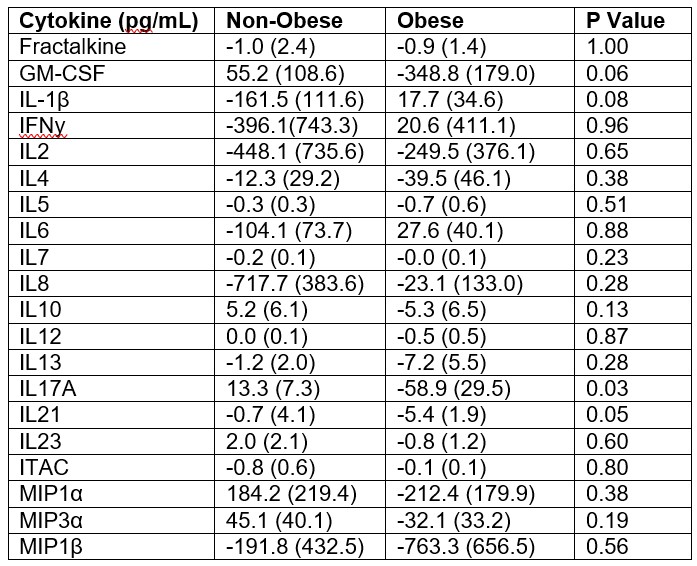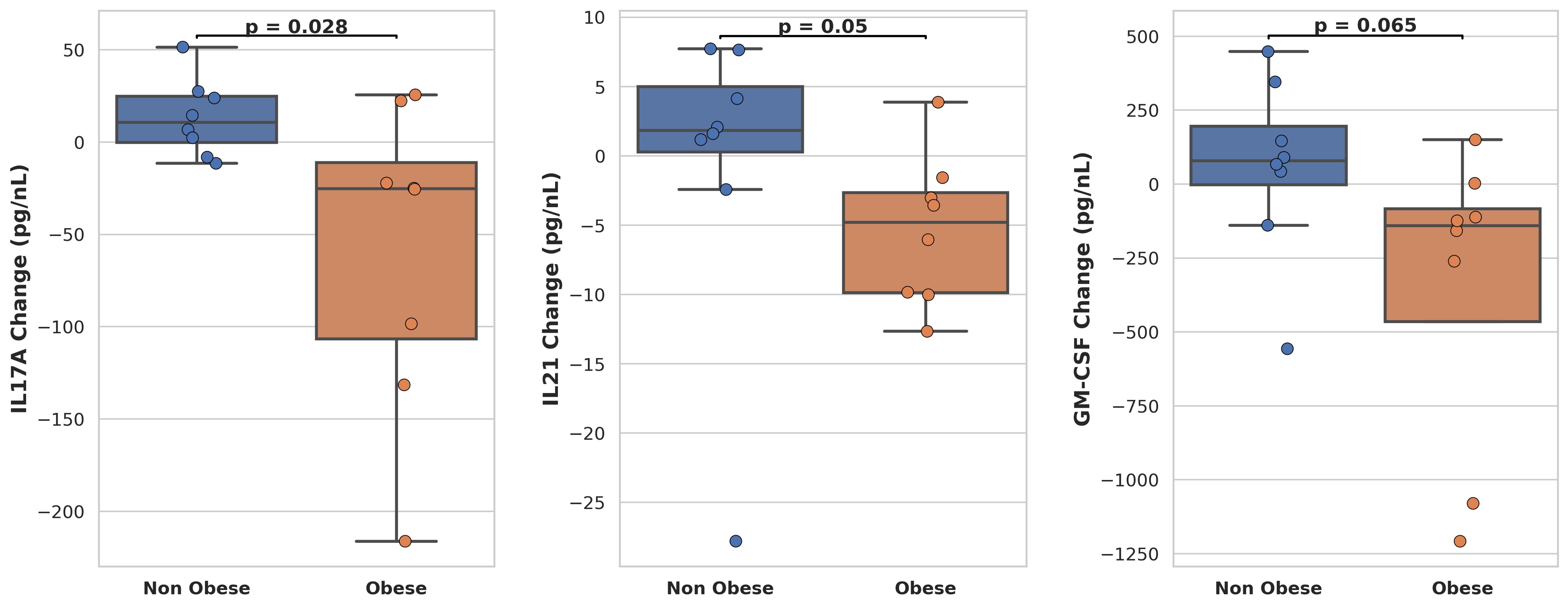Tuesday Poster Session
Category: Diet, Nutrition, and Obesity
P4852 - Walnut Consumption Decreases Cytokine Secretion in Obese Subjects at Increased Risk of Colorectal Cancer
Tuesday, October 28, 2025
10:30 AM - 4:00 PM PDT
Location: Exhibit Hall

Yasheen Gao, BS
Frank H. Netter MD School of Medicine
North haven, CT
Presenting Author(s)
Award: ACG Presidential Poster Award
Yasheen Gao, BS1, Nuoxi Fan, BSc2, John W. Birk, MD3, Haleh Vaziri, MD4, Masako Nakanishi, PhD5, Daniel Rosenberg, MS, PhD3
1Frank H. Netter MD School of Medicine, North haven, CT; 2University of Connecticut Health Center, Niantic, CT; 3University of Connecticut School of Medicine, Farmington, CT; 4UConn, Farmington, CT; 5University of Connecticut Health, Farmington, CT
Introduction: Walnuts contain an array of anti-inflammatory properties that have been shown in preclinical models to reduce risk of colorectal cancer (CRC) development. The following study evaluates the impact of obesity, associated with the chronic production of inflammatory cytokines, on the potential benefits of walnuts in a clinical study. We evaluated the effects of walnuts on inflammation in 28 subjects with increased risk of CRC and assessed whether obesity status impacted these changes.
Methods: Twenty-eight subjects were enrolled with elevated risk of CRC, defined as: 1) significant family history of CRC, 2) positive FIT/Cologuard test, or 3) personal history of advanced colorectal polyps. After consent, subjects underwent a 7-day wash-out period followed by a 21-day intervention, during which subjects consumed shelled, raw walnuts (56 gm/day). Peripheral blood mononuclear cells (PBMCs) were isolated from 28 subjects before and after walnut consumption. The percentage of lymphocytes, monocytes, T cells, T helper cells, cytotoxic T cells, B cells, and NK cells was determined by flow cytometry. For a subset of 8 obese (BMI ≥30 kg/m2) and 8 non-obese (BMI< 30 kg/m2) subjects, PBMCs were stimulated in culture for 24 hours with PMA (10 ng/mL) and ionomycin(1 µg/mL), and multiplex ELISA was used to determine the changes in secretion of 17 inflammatory cytokines, before and after walnut consumption. The Wilcoxon signed-rank test was conducted to determine whether there was a statistically significant change between paired samples before and after walnut consumption.
Results: Obesity status had a significant effect on cytokine secretion in PBMCs. Obese subjects showed significantly impaired mean capacity to secrete IL-17A (-58.9 pg/mL vs 13.3 pg/mL, p=0.03) and IL-21 (-5.4 pg/mL vs -0.7 pg/mL, p=0.05), as well as a borderline statistically significant decreased mean capacity to secrete GM-CSF (-348.9 pg/mL vs 55.2 pg/mL, p=0.06), compared to non-obese subjects. No statistically significant differences in immune cell populations were found in obese vs non-obese subjects following walnut consumption, although CD64+ monocytes were trending towards a decline in obese subjects.
Discussion: Our study provides support for the role of walnut consumption in decreasing systemic inflammation in a subset of patients with increased risk of CRC with high BMI. Further research is needed to determine the mechanisms by which walnuts affect immune cell composition and function, especially among the obese population.

Figure: Walnut consumption decreases IL17A, IL21, and GM-CSF secretion in stimulated PBMCs of obese (n = 8) versus non-obese (n = 8) subjects with increased risk of CRC.

Figure: Mean (SE) changes in cytokine secretion by stimulated PBMCs in obese (n = 8) versus non-obese subjects (n = 8) with increased risk of CRC.
Disclosures:
Yasheen Gao indicated no relevant financial relationships.
Nuoxi Fan indicated no relevant financial relationships.
John Birk indicated no relevant financial relationships.
Haleh Vaziri indicated no relevant financial relationships.
Masako Nakanishi indicated no relevant financial relationships.
Daniel Rosenberg indicated no relevant financial relationships.
Yasheen Gao, BS1, Nuoxi Fan, BSc2, John W. Birk, MD3, Haleh Vaziri, MD4, Masako Nakanishi, PhD5, Daniel Rosenberg, MS, PhD3. P4852 - Walnut Consumption Decreases Cytokine Secretion in Obese Subjects at Increased Risk of Colorectal Cancer, ACG 2025 Annual Scientific Meeting Abstracts. Phoenix, AZ: American College of Gastroenterology.
Yasheen Gao, BS1, Nuoxi Fan, BSc2, John W. Birk, MD3, Haleh Vaziri, MD4, Masako Nakanishi, PhD5, Daniel Rosenberg, MS, PhD3
1Frank H. Netter MD School of Medicine, North haven, CT; 2University of Connecticut Health Center, Niantic, CT; 3University of Connecticut School of Medicine, Farmington, CT; 4UConn, Farmington, CT; 5University of Connecticut Health, Farmington, CT
Introduction: Walnuts contain an array of anti-inflammatory properties that have been shown in preclinical models to reduce risk of colorectal cancer (CRC) development. The following study evaluates the impact of obesity, associated with the chronic production of inflammatory cytokines, on the potential benefits of walnuts in a clinical study. We evaluated the effects of walnuts on inflammation in 28 subjects with increased risk of CRC and assessed whether obesity status impacted these changes.
Methods: Twenty-eight subjects were enrolled with elevated risk of CRC, defined as: 1) significant family history of CRC, 2) positive FIT/Cologuard test, or 3) personal history of advanced colorectal polyps. After consent, subjects underwent a 7-day wash-out period followed by a 21-day intervention, during which subjects consumed shelled, raw walnuts (56 gm/day). Peripheral blood mononuclear cells (PBMCs) were isolated from 28 subjects before and after walnut consumption. The percentage of lymphocytes, monocytes, T cells, T helper cells, cytotoxic T cells, B cells, and NK cells was determined by flow cytometry. For a subset of 8 obese (BMI ≥30 kg/m2) and 8 non-obese (BMI< 30 kg/m2) subjects, PBMCs were stimulated in culture for 24 hours with PMA (10 ng/mL) and ionomycin(1 µg/mL), and multiplex ELISA was used to determine the changes in secretion of 17 inflammatory cytokines, before and after walnut consumption. The Wilcoxon signed-rank test was conducted to determine whether there was a statistically significant change between paired samples before and after walnut consumption.
Results: Obesity status had a significant effect on cytokine secretion in PBMCs. Obese subjects showed significantly impaired mean capacity to secrete IL-17A (-58.9 pg/mL vs 13.3 pg/mL, p=0.03) and IL-21 (-5.4 pg/mL vs -0.7 pg/mL, p=0.05), as well as a borderline statistically significant decreased mean capacity to secrete GM-CSF (-348.9 pg/mL vs 55.2 pg/mL, p=0.06), compared to non-obese subjects. No statistically significant differences in immune cell populations were found in obese vs non-obese subjects following walnut consumption, although CD64+ monocytes were trending towards a decline in obese subjects.
Discussion: Our study provides support for the role of walnut consumption in decreasing systemic inflammation in a subset of patients with increased risk of CRC with high BMI. Further research is needed to determine the mechanisms by which walnuts affect immune cell composition and function, especially among the obese population.

Figure: Walnut consumption decreases IL17A, IL21, and GM-CSF secretion in stimulated PBMCs of obese (n = 8) versus non-obese (n = 8) subjects with increased risk of CRC.

Figure: Mean (SE) changes in cytokine secretion by stimulated PBMCs in obese (n = 8) versus non-obese subjects (n = 8) with increased risk of CRC.
Disclosures:
Yasheen Gao indicated no relevant financial relationships.
Nuoxi Fan indicated no relevant financial relationships.
John Birk indicated no relevant financial relationships.
Haleh Vaziri indicated no relevant financial relationships.
Masako Nakanishi indicated no relevant financial relationships.
Daniel Rosenberg indicated no relevant financial relationships.
Yasheen Gao, BS1, Nuoxi Fan, BSc2, John W. Birk, MD3, Haleh Vaziri, MD4, Masako Nakanishi, PhD5, Daniel Rosenberg, MS, PhD3. P4852 - Walnut Consumption Decreases Cytokine Secretion in Obese Subjects at Increased Risk of Colorectal Cancer, ACG 2025 Annual Scientific Meeting Abstracts. Phoenix, AZ: American College of Gastroenterology.

